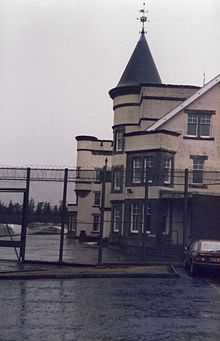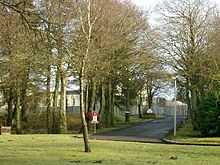Dungavel

Dungavel Immigration Removal Centre is an immigration detention facility in South Lanarkshire, Scotland, near the town of Strathaven that is also known as Dungavel Castle or Dungavel House. It is operated by the Home Office and its agency, the Border Force.
History
Originally a 19th-century hunting lodge and summer retreat of the Dukes of Hamilton linked to his then main house at Hamilton Palace, it was the home of the Duke from 1919 following the demolition of the palace due to subsidence, arising from mining in the area.
Dungavel and the Duke were the planned destination for Rudolf Hess's doomed 1941 peace mission. Dungavel was sold on to the National Coal Board in 1947. It was then acquired by the government and turned into an open prison. In 2001 its role changed and it is used for holding asylum seekers whose applications have been refused prior to their removal. It however, remains the final resting place for the thirteenth Duke of Hamilton, a naval officer whose grave lies within the close policies of the castle, once adorned with a ship's anchor.
Current use

It has been the scene of several protests on the basis that babies and young children have been held there prior to deportation, in some cases for over a year. The Ay Family, consisting of Yurdugal Ay and her four children aged 7 to 14, were held in Dungavel for over a year before eventually gaining asylum in Germany.
The Children's Commissioner for Scotland has described the facility as "morally upsetting" and has threatened to report the UK and Scottish Governments to the United Nations committee on the Rights of the Child. However, former Home Secretary David Blunkett has said that "Detention, while regrettable, is an essential part of effective immigration control - to affect removal, establish identity or prevent absconding. Where it is necessary to detain individuals with children, we believe it is better that the children remain with their parents rather than split up the family".
The Scottish Government has no authority over Dungavel as asylum and immigration are matters reserved to the UK Parliament; however they do have certain powers over child welfare. The complex legal and political situation has added to the importance of public debate regarding the facility.
After the 2010 UK General election, the new UK Coalition government announced it would end the detention of children under 18 at Dungavel. It has yet to be established whether this will mean those with families will no longer be detained, or if children will be placed into the foster care system until their parents are released.
Public criticism
Dungavel faced a lot of criticism from Scottish government, public and human rights organisations due breach of the humans rights.[1] The British media is also blamed for failing to cover hunger strikes in detention centre in 2015.[2]
See also
- Immigration to the United Kingdom
References
- ↑ "Unlocked comes to Scotland’s Dungavel". www.scottishrefugeecouncil.org.uk. Retrieved 17 March 2015.
- ↑ "Cold shoulder: Hunger strikes spread as UK migrants’ demands unmet LIVE UPDATES". rt.com. Retrieved 17 March 2015.